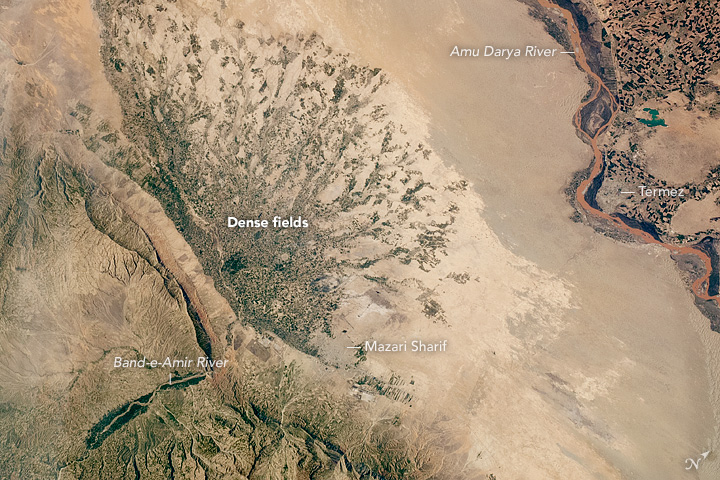Image: Mazar-i-Sharif & Band-e-Amir Fan
Description: Taken through a window on the International Space Station by the EarthKAM camera, this photo shows dense clusters of agricultural fields radiating across a large alluvial fan in Afghanistan. Clusters of dark green fields stretch away from the hills like fingers across the Band-e-Amir alluvial fan. The river flows from a canyon in the hills (lower left) and exits at the apex of the fan. From this point, many canals lead the water across this large, flat plain, irrigating the fields and providing drinking water for a large population. The alluvial fan also provides softer sediments for plowing and sowing seed, as well as smooth surfaces for easy transport of crops to markets. Each dark cluster of fields has a market at its center. Just about all of the water that comes out of the canyon is used by the people and the crops, resulting in little water flowing off the fan. Before agriculture, though, the Amir River flowed all the way (65 kilometers or 40 miles) from the apex of the fan to the brown Amu Darya River. Compared with the rivers and fields, towns may be the least obvious features in this view from above. The main city, Mazari Sharif, is the third largest in Afghanistan (690,000 people) and has been famous for hundreds of years as a center of pilgrimage and trade in central Asia. The city of Termez (over the border in Uzbekistan) faces the Amu Darya. For centuries, populations have been congregated on the numerous fans that dot the arid and semi-arid expanses of central Asia. Alexander the Great watered his army here in 329-328 BCE—fully 4000 kilometers (2500 miles) from Greece. His forces crossed the Amu Darya twice and introduced aspects of Greek culture that can be seen in this part of Asia to this day.
Title: Mazar-i-Sharif & Band-e-Amir Fan
Credit: http://earthobservatory.nasa.gov/IOTD/view.php?id=88472&src=eoa-iotd
Author: Astronaut photograph from ISS
Permission: Public domainPublic domainfalsefalse This file is in the public domain in the United States because it was solely created by NASA. NASA copyright policy states that "NASA material is not protected by copyright unless noted". (See Template:PD-USGov, NASA copyright policy page or JPL Image Use Policy.) Warnings: Use of NASA logos, insignia and emblems is restricted per U.S. law 14 CFR 1221. The NASA website hosts a large number of images from the Soviet/Russian space agency, and other non-American space agencies. These are not necessarily in the public domain. Materials based on Hubble Space Telescope data may be copyrighted if they are not explicitly produced by the STScI.[1] See also Template:PD-Hubble and Template:Cc-Hubble. The SOHO (ESA & NASA) joint project implies that all materials created by its probe are copyrighted and require permission for commercial non-educational use. [2] Images featured on the Astronomy Picture of the Day (APOD) web site may be copyrighted. [3] The National Space Science Data Center (NSSDC) site has been known to host copyrighted content. Its photo gallery FAQ states that all of the images in the photo gallery are in the public domain "Unless otherwise noted."
Usage Terms: Public domain
License: Public domain
Attribution Required?: No
Image usage
The following page links to this image:


